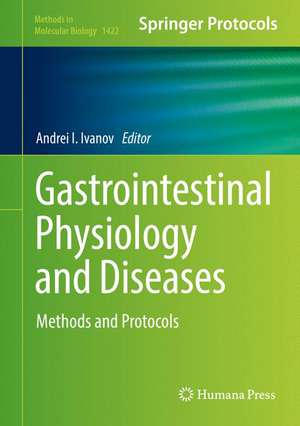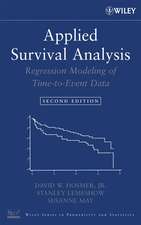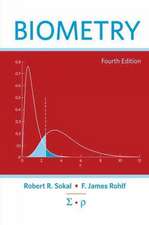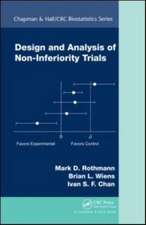Gastrointestinal Physiology and Diseases: Methods and Protocols: Methods in Molecular Biology, cartea 1422
Editat de Andrei I. Ivanoven Limba Engleză Hardback – iun 2016
Highly practical and clearly written, Gastrointestinal Physiology andDiseases: Methods and Protocols will serve both seasoned researchers as well asnewcomers to the field and will providea unique resource and expert guidance to modern laboratory techniques developedfor examining normal functions and diseases of the gastrointestinal tract.
| Toate formatele și edițiile | Preț | Express |
|---|---|---|
| Paperback (1) | 907.87 lei 6-8 săpt. | |
| Springer – 26 mai 2018 | 907.87 lei 6-8 săpt. | |
| Hardback (1) | 733.66 lei 6-8 săpt. | |
| Springer – iun 2016 | 733.66 lei 6-8 săpt. |
Din seria Methods in Molecular Biology
- 9%
 Preț: 791.63 lei
Preț: 791.63 lei - 23%
 Preț: 598.58 lei
Preț: 598.58 lei - 20%
 Preț: 882.98 lei
Preț: 882.98 lei -
 Preț: 252.05 lei
Preț: 252.05 lei - 5%
 Preț: 802.70 lei
Preț: 802.70 lei - 5%
 Preț: 729.61 lei
Preț: 729.61 lei - 5%
 Preț: 731.43 lei
Preț: 731.43 lei - 5%
 Preț: 741.30 lei
Preț: 741.30 lei - 5%
 Preț: 747.16 lei
Preț: 747.16 lei - 15%
 Preț: 663.45 lei
Preț: 663.45 lei - 18%
 Preț: 1025.34 lei
Preț: 1025.34 lei - 5%
 Preț: 734.57 lei
Preț: 734.57 lei - 18%
 Preț: 914.20 lei
Preț: 914.20 lei - 15%
 Preț: 664.61 lei
Preț: 664.61 lei - 15%
 Preț: 654.12 lei
Preț: 654.12 lei - 18%
 Preț: 1414.74 lei
Preț: 1414.74 lei - 5%
 Preț: 742.60 lei
Preț: 742.60 lei - 20%
 Preț: 821.65 lei
Preț: 821.65 lei - 18%
 Preț: 972.30 lei
Preț: 972.30 lei - 15%
 Preț: 660.49 lei
Preț: 660.49 lei - 5%
 Preț: 738.41 lei
Preț: 738.41 lei - 18%
 Preț: 984.92 lei
Preț: 984.92 lei - 5%
 Preț: 733.29 lei
Preț: 733.29 lei -
 Preț: 392.60 lei
Preț: 392.60 lei - 5%
 Preț: 746.26 lei
Preț: 746.26 lei - 18%
 Preț: 962.66 lei
Preț: 962.66 lei - 23%
 Preț: 860.22 lei
Preț: 860.22 lei - 15%
 Preț: 652.64 lei
Preț: 652.64 lei - 5%
 Preț: 1055.50 lei
Preț: 1055.50 lei - 23%
 Preț: 883.87 lei
Preț: 883.87 lei - 19%
 Preț: 491.89 lei
Preț: 491.89 lei - 5%
 Preț: 1038.86 lei
Preț: 1038.86 lei - 5%
 Preț: 524.16 lei
Preț: 524.16 lei - 18%
 Preț: 2122.34 lei
Preț: 2122.34 lei - 5%
 Preț: 1299.23 lei
Preț: 1299.23 lei - 5%
 Preț: 1339.12 lei
Preț: 1339.12 lei - 18%
 Preț: 1390.26 lei
Preț: 1390.26 lei - 18%
 Preț: 1395.63 lei
Preț: 1395.63 lei - 18%
 Preț: 1129.65 lei
Preț: 1129.65 lei - 18%
 Preț: 1408.26 lei
Preț: 1408.26 lei - 18%
 Preț: 1124.92 lei
Preț: 1124.92 lei - 18%
 Preț: 966.27 lei
Preț: 966.27 lei - 5%
 Preț: 1299.99 lei
Preț: 1299.99 lei - 5%
 Preț: 1108.51 lei
Preț: 1108.51 lei - 5%
 Preț: 983.76 lei
Preț: 983.76 lei - 5%
 Preț: 728.16 lei
Preț: 728.16 lei - 18%
 Preț: 1118.62 lei
Preț: 1118.62 lei - 18%
 Preț: 955.25 lei
Preț: 955.25 lei - 5%
 Preț: 1035.62 lei
Preț: 1035.62 lei - 18%
 Preț: 1400.35 lei
Preț: 1400.35 lei
Preț: 733.66 lei
Preț vechi: 772.26 lei
-5% Nou
Puncte Express: 1100
Preț estimativ în valută:
140.40€ • 146.04$ • 115.91£
140.40€ • 146.04$ • 115.91£
Carte tipărită la comandă
Livrare economică 12-26 aprilie
Preluare comenzi: 021 569.72.76
Specificații
ISBN-13: 9781493936014
ISBN-10: 1493936018
Pagini: 335
Ilustrații: XV, 353 p. 87 illus., 62 illus. in color.
Dimensiuni: 178 x 254 x 22 mm
Greutate: 0.86 kg
Ediția:1st ed. 2016
Editura: Springer
Colecția Humana
Seria Methods in Molecular Biology
Locul publicării:New York, NY, United States
ISBN-10: 1493936018
Pagini: 335
Ilustrații: XV, 353 p. 87 illus., 62 illus. in color.
Dimensiuni: 178 x 254 x 22 mm
Greutate: 0.86 kg
Ediția:1st ed. 2016
Editura: Springer
Colecția Humana
Seria Methods in Molecular Biology
Locul publicării:New York, NY, United States
Public țintă
Professional/practitionerCuprins
CRISPR/Cas9 mediatedGenome-editing of Mouse Small Intestinal Organoids.- Lentivirus-basedStable Gene Delivery into Intestinal Organoids.- Co-culture ofGastric Organoids and Immortalized Stomach Mesenchymal Cells.- An Air-LiquidInterface Culture System for 3D Organoid Culture of Diverse PrimaryGastrointestinal Tissues.- OrganotypicalTissue Cultures from Fetal and Neonatal Murine Colon.- Using Chamber Technique to Measure Intestinal EpithelialPermeability.- HPLC-based Metabolomic Analysis of Normal andInflamed Gut.- NMR-basedMetabolomic Analysis of Normal and Inflamed Gut.- Analysisof microRNA Levels in Intestinal Epithelial Cells.- Detecting Reactive Oxygen Species Generation and StemCell Proliferation in the DrosophilaIntestine.- Imaging Inflammatory Hypoxia in the Murine Gut.- Label-free Imaging of Eosinophilic Esophagitis MouseModels Using Optical Coherence Tomography.- Near Infrared Fluorescence Endoscopyto DetectDysplastic Lesions in the Mouse Colon.- Visualizationof Signaling Molecules during Neutrophil Recruitment in Transgenic MiceExpressing FRET Biosensors.- In VivoMyeloperoxidase Imaging and Flow Cytometry Analysis of Intestinal Myeloid Cells.- MacrophageIsolation from the Mouse Small and Large Intestine.- Isolationand Functional Analysis of Lamina Propria Dendritic Cells from the Mouse SmallIntestine.- Purification and Adoptive Transfer of Group 3 Gut InnateLymphoid Cells.- Immunotherapy with iTreg and nTreg Cells in a MurineModel of Inflammatory Bowel Disease.- Isolation of Eosinophils from the Lamina Propria of theMurine Small Intestine.- Investigation ofHost and Pathogen Contributions to Infectious Colitis Using the Citrobacter rodentium Mouse Model ofInfection.- Murine Trinitrobenzoic Acid-induced Colitis as a Model of Crohn’sDisease.- Oxazolone-induced Colitis as a Model of Th2 ImmuneResponses in the Intestinal Mucosa.- The Mongolian Gerbil: A Robust Model of Helicobacter pylori-induced GastricInflammation and Cancer.- A Rapid ScreenableAssay for Compounds that Protect Against Intestinal Injury in Zebrafish Larva.- AOM/DSS Model of Colitis-Associated Cancer.- Characterizationof Colorectal Cancer Development in Apc min/+Mice.- Modeling Murine GastricMetaplasia through Tamoxifen-Induced Acute Parietal Cell Loss.- The Hamster Buccal Pouch Modelof Oral Carcinogenesis.
Textul de pe ultima copertă
This volume provides a comprehensive collection of classical and cutting edge protocols and techniques to examine the normal development and physiological functions of the gastrointestinal system and to model the most common digestive diseases. The chapters focus on diverse research topics including ex vivo systems to study gastrointestinal development and functions, in vivo imaging of the gastrointestinal tract, isolation and characterization of intestinal immune cells, and animal models of gastrointestinal inflammation and cancer. The Gastrointestinal Physiology and Diseases: Methods and Protocols book targets wide audience of physiologists, cell and developmental biologists, immunologists, and physician-scientists working in the field of gastroenterology and beyond. Written in the highly successful Methods in Molecular Biology series format, chapters include introductions to their respective topics, lists of the necessary materials and reagents, step-by-step, readily reproducible laboratory protocols, and tips on troubleshooting and avoiding known pitfalls.
Highly practical and clearly written, Gastrointestinal Physiology and Diseases: Methods and Protocols will serve both seasoned researchers as well as newcomers to the field and will provide a unique resource and expert guidance to modern laboratory techniques developed for examining normal functions and diseases of the gastrointestinal tract.
Highly practical and clearly written, Gastrointestinal Physiology and Diseases: Methods and Protocols will serve both seasoned researchers as well as newcomers to the field and will provide a unique resource and expert guidance to modern laboratory techniques developed for examining normal functions and diseases of the gastrointestinal tract.
Caracteristici
Includes cutting-edge methods and protocols Provides step-by-step detail essential for reproducible results Contains key notes and implementation advice from the experts









